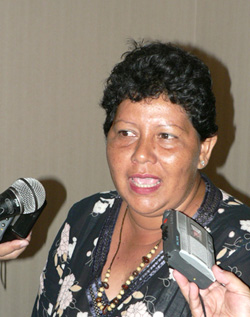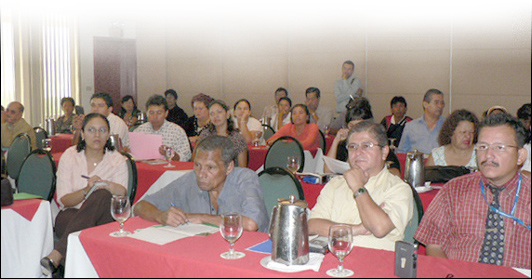|
Social and
environmental impacts of agrotoxic substance use
New government, same old indifference?
The Alliance for the Protection of Biodiversity* organized
an event to raise awareness on the social and environmental
impacts caused by the use of agrotoxic substances in the
country. Authorities continue to turn a deaf ear to the
situation of the people affected by Chronic Renal Failure (CRF)
According to Denis Meléndez, of the Health
Information and Advisory Services Center (CISAS),
“The agro-export model adopted in Nicaragua in the
mid 20th century was characterized by the use of
very large quantities of chemicals in production and for not
requiring skilled labor. Starting in the 1960s, Nicaragua
was called to play the leading role in the development of
Central America’s chemical industry, in the framework of the
region’s industrial growth process. People started dying
with no identifiable cause, a dramatic situation that has
become increasingly worse over time. In recent years, and
predominantly in Nicaragua’s western region
-the hub of agro-export productions-, the devastating
impacts of the indiscriminate use of agrotoxic substances
have become evident.”
|

Denis
Meléndes |
One of the most severe consequences of this model of
production is the case of former sugar workers affected by
Chronic Renal Failure (CRF). According to information
provided by the Nicaraguan Association of People Affected by
Chronic Renal Failure “Domingo Téllez” (ANAIRC), a total of
2,427 people had died as of April 8, 2007. In the last 24
months alone, an appalling 1,420 deaths have occurred, with
an average of 59 people dying per month.
“If we look at the incidence figures for deaths from
occupational illnesses –Meléndez continued– or for
deaths caused by epidemics or AIDS, we’ll see that CRF
is decimating the population. This should be cause for alarm
among the authorities, who should be moving to immediately
adopt measures in the country’s western region and in any
other areas where cases have been reported among the people
working in major agricultural productions.”
In Nicaragua, like in other Central American
countries, it was some time before the phenomenon of CRF
was identified, because people didn’t know what they
were dying from and the organizations lacked the means to
understand what was going on, and also because doctors were
treating people as if they were suffering from a common
illness. They failed to include in the patient’s medical or
work file the relevant information that could establish a
connection between the worker’s job and the illness that he
or she was suffering from.
“The remnants of the chemical industry developed years ago
are still standing in the country –the CISAS
representative recalled–, and chemical products that have
been banned are still stored in some sites. This is all an
ongoing source of pollution. We have serious water and soil
contamination problems, but what’s worst is that history is
repeating itself, because agrotoxic chemicals that are no
longer marketed in developed countries are still being used
here. The Ministry of Agriculture (MAGFOR) has been
indulgent with these products,” Meléndez observed.
“This is further aggravated by the risk posed by the
implementation of the new model of biofuel production -he
continued-, which is designed to feed vehicles, not meet the
needs of people. Corn is being grown to produce ethanol,
while the price of tortillas –the main staple of the
national diet- has shot up throughout the country. Palm oil
plantations are also competing with people for the use of
groundwater sources, and this is a model of production that
will exacerbate the situation. In the case of CRF,
not even with the adoption of Law N° 456 (Act for the
Addition of Occupational Risks and Illnesses in Law N° 185,
Labor Code) have the authorities assumed the responsibility
of dealing with the effects of this disease. People are
still drinking the water, unaware that it is contaminated,”
Meléndez said.
Carmen Ríos,
president of ANAIRC, also spoke at the event.
|

Carmen Ríos |
“The most horrible thing is happening in the west: people
are dying to produce sugar, rum, and, now, ethanol,” Ríos
denounced. The region is known for its excellent
conditions for production, but that shouldn’t have to be a
curse. A large corporation, the owner of Ingenio San
Antonio, has brought jobs to the region, but it has also
brought death. The company is not the only one responsible
for what’s happening, the governments are also at fault, for
failing to protect the health of the workers, the population
and the environment. Ingenio San Antonio claims it has no
responsibility, the Ministry of Health (MINSA) says
it has nothing to do with us, because our problem falls
under the responsibility of the Social Security agency (INSS),
and the INSS tells us that it has a very small supply of
medicines and refuses to grant us occupational risk
insurance. Who’s going to answer for everything that has
already happened?” the president of ANAIRC asked the
audience. “We have the right to claim compensation for
everyone who is suffering from CRF and for everyone
who has died. We have a law that backs us and even though
we’re coming up against a large company, we know we can win
this battle. This is the harsh life of the former sugar cane
workers, the bitter sorrow of their widows and of all those
who gave their lives to this company and now don’t even have
the means to buy the medicine they need,” she concluded.
Closing the event, the Alliance for the Protection of
Biodiversity and ANAIRC announced to the media
the demands aimed at the various bodies and authorities:
-
Health, labor and social authorities must deal with this
situation as an emergency.
-
On March 13, ANAIRC sent a letter to the
executive president of the INSS and has received
no answer to date. Social Security authorities must
continue working to urgently address pension requests
from CRF victims and to grant any pensions that
have been denied due to faults in the social security
system.
-
The company or companies involved in these CRF
cases must be held accountable for the damage caused to
workers, former workers and their families, for their
living conditions, and for exposing them to health
hazards. Formal negotiations must begin immediately,
facilitated by national authorities, to make any
companies involved assume their responsibility for this
situation.
-
Labor authorities must adopt measures to properly
enforce any applicable legislation.
-
The government must adopt a technical standard for cane
burning. Such standard should incorporate the
recommendations of the people that have been exposed to
unsafe working conditions and whose health has been
negatively affected.
-
It is necessary to reactivate the mechanisms provided
under the regulatory framework to give immediate
attention to the situation caused by the intensive and
indiscriminate use of synthetic agrotoxic substances,
and to encourage the adoption of production practices
consistent with a healthy environment.
|
From
Managua,
Giorgio Trucchi
© Rel-UITA
April 13, 2007 |
 |
|
|
* Nicaraguan Human Rights
Center (Cenidh), Humboldt Center, Health Information
and Advisory Services Center (Cisas), National
Federation of Agriculture and Agro-Industrial Cooperatives (Fenacoop),
Consumer Defense League of Nicaragua (Lideconic),
Peasant-to-Peasant Program-UNAG, Mesoamerican Sustainable
Agriculture Information Service (Simas), National Associated
Producers Union (Unapa), International Union of Food
Workers (IUF).

|